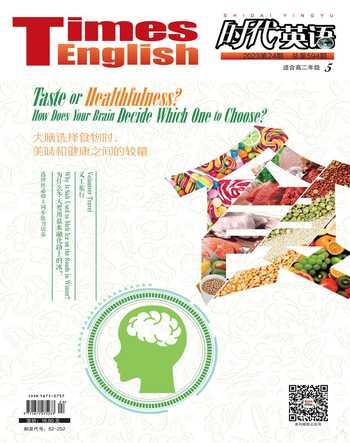Taste or Healthfulness? How Does Your Brain Decide Which One to Choose?大脑选择食物时,美味和健康之间的较量



You dash into a convenience store for a quick snack, spot an apple and reach for a candy bar instead. In fact, poor self-control may not be the only factor behind your choice. Thats because our brains process taste information first, before factoring in health information, according to a study from Duke University in the US.
“People all over the world spend billions of dollars every year on diet products, yet most people fail when they attempt to diet,” said study co-author Scott Huettel, a professor of psychology and neuroscience at Duke. “Taste seems to have an advantage that sets us up for failure.”
For many individuals, health information enters the decision process too late (relative to taste information) to drive choices toward the healthier option.
A paper, which appears in Nature Human Behavior, described the advantage taste has over healthfulness in the decision-making process.
你快步走进一家便利店,想买点零食充饥,你发现货架上有苹果,但最后却选择了糖果。事实上,自我控制能力差可能并非你做出这一选择的唯一原因。根据美国杜克大学的一项研究,之所以做出这样的选择是因为我们的大脑优先处理味道信息,然后才考虑健康信息。
研究报告的合著者、杜克大学心理学和神经科学教授斯科特·许特尔说:“全世界的人每年在减肥产品上花费数十亿美元,但大多数人在尝试减肥时失败了。味道似乎有一种优势,使我们陷入失败。”
对许多人来说,在决策过程中,健康信息(相对味道信息)出现得太晚,因此无法促使人们选择更健康的食物。
发表在《自然·人类行为》的一篇论文描述了在决策过程中,味道比健康更有优势。
“Weve always assumed people make unhealthy choices because thats their preference or because they arent good at self-control,” said study co-author Nicolette Sullivan. “It turns out its not just a matter of self-control. Health is slower for your brain to estimate—it takes longer for you to include that information into the process of choosing between options.”
研究報告的合著者尼科莱特·沙利文说:“我们一直认为,人们做出不健康的选择是因为他们偏爱这样的选择或者是因为他们不善于自我控制。事实证明,这不仅仅是自我控制的问题。你的大脑对健康状况的估计要慢一些——你需要更长的时间将健康信息纳入选择的过程。”
For the study, Sullivan and Huettel recruited 79 young adults of a median age of 24.4 years. Participants were asked to fast for four hours before the experiment.
Participants were asked to rate snack foods on their tastiness, healthfulness and desirability. They were then presented with pairs of foods and asked to choose between them—and the researchers timed their choices.
At the end of the experiment, participants were offered one of the foods they had chosen.
Participants registered taste information early in their decision process—taking about 400 milliseconds on average to incorporate taste information. Participants took twice as long to incorporate information about a snacks healthfulness into their decisions.
That may not sound like much time. In many cases though, its enough to alter the choice we make.
在这项研究中,沙利文和许特尔招募了79名年轻人,他们的平均年龄为24.4岁。参与者在实验前被要求禁食4小时。
参与者被要求对零食的味道、健康程度和受欢迎程度进行评分。然后,研究人员给他们提供成对的食物,让他们在其中做出选择——研究人员计算了他们做出选择的时间。
在实验的最后,参与者获得了他们选择的食物中的一种。
零食的味道信息在决策过程的早期就参与进来了——参与者平均需要约400毫秒的时间来纳入味道信息。而他们花了两倍的时间来将零食的健康信息纳入他们的决策过程。
也许这听起来并没有花很长的时间。但在很多情况下,这足以改变我们的选择。
“Not every decision is made quickly—house purchases, going to college—people take time to make those choices,” Huettel said. “But many decisions we make are fast—people reach for something in the grocery store or click on something online.”
The authors said their findings could apply to other choices, not just food. For instance, some financial decisions, such as saving and spending choices, may also be affected by how—and when—the brain processes different types of information.
Meanwhile, all is not lost in the war against junk food cravings.
Half of the participants received a blurb before the experiment, stressing the importance of eating healthy food. These participants were less likely to choose an unhealthy snack.
The authors also identified something simple that can help people with their food choices: slowing down the decision-making process. When participants took longer to consider their options, they tended to pick healthier ones.
許特尔说:“不是每个决定都是很快做出的,比如买房、上大学,人们需要时间来做出这些决定。但我们的很多决定都是很快做出的,比如人们在杂货店买东西,或者在网上点击某件商品。”
研究报告的作者表示,他们的发现不仅适用于食物,还适用于其他选择。例如,一些财务决策,如储蓄和消费选择,也可能受到大脑处理不同类型信息的方式和时间的影响。
与此同时,在对抗垃圾食品欲望时,人们并不是毫无胜算。
一半的参与者在实验前接受过强调健康饮食的重要性的宣传。这些参与者不太可能选择不健康的零食。
研究报告的作者还发现一个可以帮助人们选择健康食物的简单方法:减缓决策过程。当参与者花更长的时间考虑他们的选择时,他们倾向于选择更健康的食物。
Word Bank
recruit /r?'kru?t/ v. 吸收;招募
fast /fɑ?st/ v. 节食;禁食
incorporate /?n'k??p?re?t/ v. 包含;吸收;使并入
We have incorporated all the latest safety features into the design.
craving /'kre?v??/ n. 强烈的愿望;渴望
- 时代英语·高二的其它文章
- Who Can Approach the Game of Go in Ancient China?在中国古代,什么样的人才可以下围棋?
- Why Is Salt Used to Melt Ice on the Roads in Winter?为什么冬天要用盐来融化路上的冰?
- Volunteer Travel 义工旅行
- Exploration of High School English Poetry Teachingfrom the Perspective of English Activities英语活动观下的高中英语诗歌教学初探
- Unit 2 A life’s work
- Unit 1 Face values

